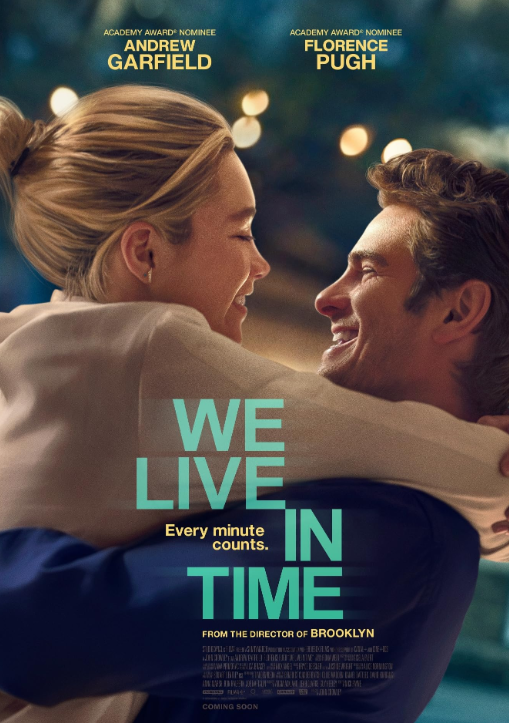“We Live in Time,” starring award-winning actors Andrew Garfield and Florence Pugh, is a time-leaping, emotional rollercoaster that makes audience members teeter between joyful laughter and tears.
The story follows Almut, played by Pugh, and Tobias, played by Garfield, as they fall in love and spend their lives together. Though the timeline isn’t linear and is at times somewhat disorienting, the audience is taken on a beautiful story of heartbreak and romance. The film takes place at three separate points in time: the beginning of Almut and Tobias’ relationship, their present-day lives that involve a child and a cancer diagnosis, and moments in between.
The film opens with Almut’s cancer diagnosis, which leads her to bring up the question to Tobias: Is it better to have 12 miserable months of treatment or six wonderful months full of life?
This less-than-optimal way of meeting the characters is nothing compared to the unique way they meet each other earlier in the timeline.
Tobias is on the hunt for a pen with which to sign his divorce papers when he is struck by Almut’s car.
He awakes in the hospital to find her sitting across from him. The two leave together and end up at a diner. This is the beginning of a complicated yet beautifully human relationship between the two that spans decades. Garfield’s character is tender and soft, and Pugh’s character is fiercely determined and career-oriented.
The relationship is full of passion from the beginning, and things quickly progress after their first meeting.
Despite their immediate connection, the two have difficult conversations early on in their relationship. Unlike Tobias, Almut is unsure that she sees children as a part of her future. When the issue is raised by Tobias, Almut becomes defensive, and the conversation leads to a fight that ends with a brief separation for the couple. Afterward, Tobias makes the first move toward reconciliation.
This becomes a theme in their relationship: Tobias is willing to start the difficult conversations, and Almut, though she loves him deeply, seems to keep him at arm’s length.
This theme is beautifully showcased during a scene taking place at a later point in time when Almut raises the question of whether treatment for her recurring cancer is worth it or not. Almut is standing arm’s length from Tobias, and he reaches out to lay his hand on her. This scene is particularly impactful because it serves as a physical representation of the chasm between the characters, one that felt all too human.
Eventually, Almut comes around to the idea of a child, raising the subject again much later in their relationship. It seems to be implied that her mind changed not because she decided she always wanted children, but because she wants them with Tobias.
However, Almut’s initial hesitation could be to blame for the relationship she ends up having with her daughter, Ella.
Though her love for Ella is obvious, Tobias is the more nurturing and present parent in Ella’s life. After her diagnosis, Almut struggles with her fear of dying and having not left anything meaningful enough behind. This causes some issues with Tobias, as he feels as though Almut is saying that he and Ella were not enough for her when in reality, she just wanted something for herself outside of them to leave behind.
Garfield’s character stands out next to Pugh, who is known for her performances in emotional roles. Garfield plays Tobias as gentle and nurturing, in contrast to Almut’s somewhat abrasiveness. The audience sympathizes with him when the two fight or when an argument does not turn out in his favor.
The emotions shown by Garfield are visceral, perfectly conveying every feeling that he, and the audience, are experiencing: joy, sadness, hurt and anger. He adeptly communicates subtle changes in emotion without ever having to say anything at all. While Pugh’s acting is impressive and her character is strong, Garfield is the emotional anchor of the film.
“We Live in Time” is a film that will stay with audiences, not just for its highs and lows, but for all the mundane, chaotic and authentic moments in between.









